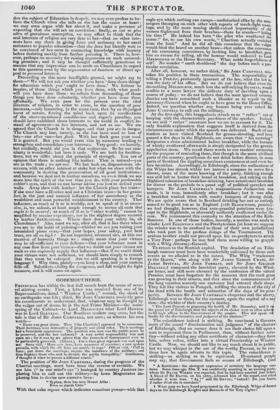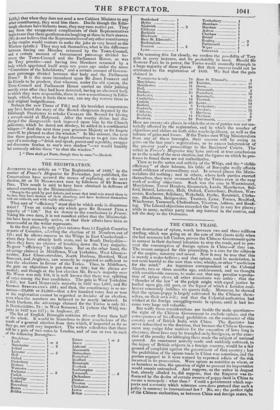GOBEMOUCHERIE.
EDINBURGH has within the last dull month been the scene of seve- ral stirring events. First, a letter was received from one of its Representatives, dated " Windsor Castle ; " second, the shock of an earthquake was felt ; third, Sir JOHN CAMPBELL modestly gave his constituents to understand, that, whatever may be thought by the vulgar out of doors, he is the real Prime Minister—the main- spring of the Cabinet—to Lord MELBOURNE what Lord llowseis was to Lord GLENELG. Our Southern readers may stare, but the tale is that of Sir JOHN CAMPBELL, not ours; as witness his own words- " There was great alarm. They [the Chartists] appeared to be numerous. Their doctrines were destructive of property and social order. Their meetings had a formidable appearance. Time question was, how was the public peace to be preserved, and the law enforced ? A very awful responsibility was cast upon zan ; for it was by lux advice that the counsels of Government were to be particularly governed. (Cheers.) For a time great reproach was cast upon ME. Some said, Ilave new laws, have measures of coercion ; a new system prevails, with which the 01(1 laws are unable to cope.' Others said, Call in force ; put down the meetings; require the assistance of the military ; and thus frighten those who seek to disturb the public tranquillity.' Gentlemen, /thought it wiser to pursue a different course."
The position of Sir JOHN CAMPBELL, during the progress of the Chartist meetings, must have been the reverse of enviable. We see him (" in our mind's eye") besieged by country Justices im- ploring him to call out the military—by town Magistrates im- ploring him to devise new coercive laws: Syphax, thou has seen Mount Atlas :
Even so stands Cato."
With that calm repose which indicates conscious power—with that
eagle eye which nothing can escape—undiiturbed alike by the mess sengers thronging on each other with reports of torch-light meets ings, and by the more teasing shrill-voiced importunity of old women frightened from their benches—there he stands—" hiding Ins time!" He indeed has been " the pilot who weathered she storm :" for, to use his own words, " Chartism actually vanished front the land." And he did all this conscious that the vulgar would bind the laurel on another brow—that unless the conveners of his canvassing committees, by inviting him to breakfast, gave him an excuse for telling, all the honour would redound to Lord MELBOURNE or the Home Secretary. What noble forgetfulness of self! No wonder " earth shuddered" the day before such a par- ticular revelation.
After all, however, we rather think,* Sir JOHN CAMPBELL eds. takes his positicn in these transactions. The responsibility or telling a Premier, profoundly ignorant of the law, what the law is was the duty of his office. But we do not believe that even the do-nothing MELBOURNE, much less the self-relying RussELL, would confide to a mere lawyer the delicate duty of deciding upon a course of policy : we do not believe that the most ignorant country Justice can have committed such a blunder as to repair to the Attorney-General when he ought to have gone to the Home Office. Indeed, we question whether any human being ever asked Sir JOHN CAMPBELL to call out the military. At the first sight, this braggadocio struck us as " rather" out of keeping with the characteristic pawkiness of the speaker. linked, we are still " rather" uncertain how we are to account for it. The only feasible explanation that suggests itself is derived front the circumstances under which the speech was delivered. Such of our readers as have visited Scotland for grouse-shooting, and have passed a few days in the Highlands, are aware that " his morning" designates a drain administered before breakfast, while the bumper of whisky swallowed afterwards is simply designated by the generic appellation dram. We recall these words to our readers' memories for the purpose of reminding them, that though in the more civilized parts of' the country, gentlemen do not drink before dinner, in some parts of Scotland the tippling sometimes commences at and even be- fore breakffist. Accordingly, in Edinburgh, since the enthusiasm of the Whigs has shrunk within too narrow a compass to serve for a dinner, some of the more knowing of the party, thinking enough was still left to butter their bread at breakfast, and relying on the Highland toleration of breakfast-drinking, have substituted breakfast for dinner as the prelude to a pant. stiff: of political speeches and bumpers. Sir JOHN CAMPBELL'S magnanimous declaration was made, it is true, immediately after breakfast ; but it was after a breakfast. washed down with sundry bumpers of strong drink. We are quite aware that in Scotland drinking has not so entirely ceased to be good ton as in England (vide BLACKWOOD, passim): we had thoupt, however, that ante-prandial potations were (ex- cept in the Highlands, as aforesaid) uniformly swallowed under the rose. We recommend this enormity to the attention of the Kirk- Sessions. In one of those bodies, recently, a motion was made to rebuke Lord EGLINTOUN and the Presbyterians (at least we suppose the rebuke was to be confined to those of their own jurisdiction) who took part in the profane doings of the Tournament. The zealous brother could not prevail upon his co-presbyters to attack a Tory Peer : perhaps Ile may find them more willing to grapple with a Whig Attorney-General.
To return to the Scottish capital. The desolation of an Edin- burgh summer must have been wonderfully enlivened by three such events as we alluded to in the outset. The Whig 'tradesmen to the Queen," who along with Sir JAMES GIBSON CRAIG, Sir JAMES SPITTAL, Sir JOHN FORREST, and Sir JOHN GRAHAM DALYELL,t composed the breakffist party, elevated by the Wind- sor letter, and still more elevated by the confession of the virtual Premier, must have forgotten for the moment that the rank grass was growing in their streets, and that since the commencement of the long vacation scarcely one customer had entered their shops. They felt like visiters to Pompeii, refilling the streets of the city of the dead with the bustle and animation of the days of its pros- perity. Between Sir JOHN CAMPBELL'S eloquence and the sherry,' Edinburgh was to them, for the moment, again the capital of a nal('
i
tion—the wielder of their country's destiny. S " The Lord Provost, in proposing the health of Mr. Macaulay, said it IS the proud lot of Edinburgh that the objects of its choice were so often select m. to fill high offices in the Government of the empire. This did speak v, loudly for the discrimination and judgment of the electors!" . The coincidence indeed is striking. So convinced is Governs. ment of the sound " discrimination and judgment " of the electors'. of Edinburgh, that no sooner does it see their choice fall upon a man to represent them in Parliament, than without further scru- tiny—without asking any other certificate of character—they force him, miens volens, either into a virtual Premiership or Windsor Castle. Now, we should not like to say much about it in public, but we may whisper in the ear of the worthy Provost, to be cau- tious how he again adverts to this topic. The coincidence is striking—so striking as to be equivocal. Ill-natured people may say, that Government feels so secure of Edinburgh, (and * A Scotticism : the strongest expression of certainty the language con- tains. Some timo_ ago. Mrs. T i . was confidently asserting n an evening party, where Sir DAVID WILKIE was expected, that be Ind been married just before. A friend of Sir Davin, on his entry, informed him of the report, and asked whether it were true.. " Ay;!" said Sir DATIL); "indeed! Do you know, I rather think she is mistaken.'
j• What jests we have heard perpetrated by the Edinburgh Whigs of former days on time Edinburgh Knights and Baronets of the Tory r6gime I Leith) that when they dare not send a new Cabinet Minister to any other constituency, they send him there. Docile though the Edin- burgh electors have hitherto been, they may turn restive yet. They may from the exaggerated compliments of their Representatives btlin to see that these gentlemen are laughin g at them in their sleeves. (le do not believe that the Representatives of any other constituency in the empire would venture to make the joke so very broad as the Windsor epistle.) They may ask themselves, what is the difference between having one Member returned by the Town-Council, and a certain amount of Government patronage divided be- tween the Town-Council and the Parliament House, as was the Tory practice—and having two Members returned by a body which appointed itself some ten years ago under the name " Committee of the Inhabitants," and a certain amount of Govern- ment patronage divided between that body and the Parliament House? It is the more incumbent upon Sir JOHN FORREST and his friends to be prudent, that whereas, under the old system, the Town-Council and Parliament House carried on their jobbing merrily even after they had been detected, having no electoral body to which they were responsible, there is now a constituency in Edin- burgh, which, when it finds them out, can any day restore them to their original insignificance. Perhaps the new Thane of FifeI and his breakfast compotators may have heard the story of the Scotch clergyman deputed by the Edinburgh Presbytery to rebuke CHARLES the Second for kissing a servant-maid at IIolyrood. After the worthy divine had dis- charged the disagreeable task imposed upon him by the Church judicatory, which he dared not disobey, he added in a confidential whisper—" And the next time your gracious Majesty so for forgets yourself', be pleased to shut the window." In like manner, the next tine these gentlemen so far forget themselves as to get into their cups of a morning—" drink and speak, parrot and squabble, swagger and discourse fustian to one's own shadow "—we would humbly but earnestly advise them "to shut the window."
"Thou shalt get Peers, though thou be none."-31iwbeth.



























 Previous page
Previous page